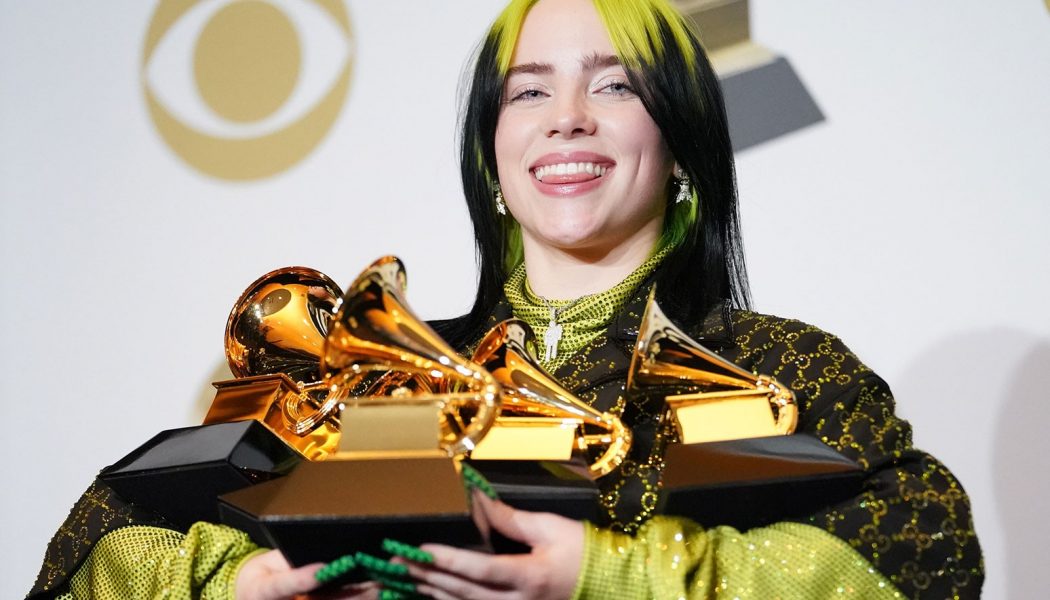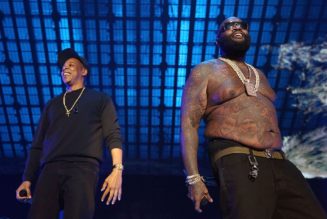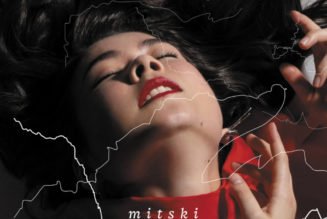
Billie Eilish is just 18 and has received two nods for both record and song of the year. That’s got to be a first, right?
It is. The previous youngest two-time nominee in the record of the year category was Kelly Rowland, who was 21 when she was nominated for the second time as a featured artist on Nelly’s “Dilemma.” Her first nod came two years before, when she was nominated as a member of Destiny’s Child with “Say My Name.”
The previous youngest two-time nominee in the song of the year category was Avril Lavigne, who was 19 when she was nominated for the second time for “I’m With You.” Her first nod was the year before when she was nominated for “Complicated.”
Eilish turns 19 on Dec. 18.
Beyoncé is nominated for best music film for Black Is King. She won in that category last year for Homecoming. Has an artist ever won back-to-back awards in that category?
No. This would be a first. Moreover, she would become just the third artist to win twice in the category, period. Sting and Madonna were the first two.
The “super deluxe edition” of Prince’s 1999 is nominated for best historical album. The “collector’s edition” of Paul McCartney’s Flaming Pie is nominated for best boxed or special limited edition package. How did these albums do in the Grammys when they were originally released?
1999 was nominated for best pop vocal performance, male for 1983 (albums and tracks competed against each other back then). A track from the album, “International Lover,” was nominated for best R&B vocal performance, male. (Michael Jackson, in the year of Thriller, won in both categories.)
Flaming Pie was nominated for album of the year for 1997, but garnered no other nominations. (Bob Dylan won album of the year for Time Out of Mind.)
Taylor Swift made it back to the album of the year finals after being shut out with her last two albums. Everybody reported that. In addition, Folklore is her seventh consecutive studio album to receive a nomination in a genre album category. Is that a record?
It’s a record for a solo artist, but Alison Krauss was nominated for genre album awards with eight consecutive studio albums, if you combine solo albums, albums she recorded with her group Union Station and two collab albums she recorded with The Cox Family and Robert Plant.
Immediately before that eight-album streak (which extended from 1992-2011), she was nominated for best bluegrass recording with two albums (once by herself, once with the group). There was no best bluegrass album award in those years (1989 and 1990). So she had 10 consecutive studio albums that were up for key Grammys. Remarkable.
As for Swift, she was nominated for best country album with three consecutive studio albums and then pivoted to pop and, without missing a beat, has been nominated for best pop vocal album with four consecutive studio albums. Swift’s only studio album to fail to receive a genre album nod was her first.
Sturgill Simpson is nominated for best rock album. He won best country album a few years ago. Has anyone else been nominated in both of these categories over the course of their career?
No. Simpson is the first. He won best country album four years ago for A Sailor’s Guide to Earth. He’s nominated for best rock album this year for Sound & Fury.
Meryl Streep is nominated for best spoken word album for Charlotte’s Web. This is her sixth Grammy nod. She has yet to win. If she wins, will she become an EGOT?
Surprisingly, no. Streep has won three Oscars and three Emmys, but has yet to win a Grammy or a Tony. Her only Tony nomination to date was a 1976 nod for featured actress in a play for 27 Wagons Full of Cotton. (That was her first nod for an EGOT-level award.) Streep’s previous Grammy nods, by the way, are all for spoken word and/or children’s recordings, except for Mamma Mia!, which was nominated for best compilation soundtrack album.
Skip Marley is nominated for best reggae album. Is there a Grammy rule that a Marley has to be nominated in that category every year?
It seems like it, doesn’t it? At least one member of the Marley clan has been nominated in 20 of the 37 years the category has been in place. The category was introduced in the 1984 awards year, three years after Bob Marley’s death. In part because there wasn’t a reggae category during his lifetime, Bob Marley never received a Grammy nomination, though he was awarded a lifetime achievement award from the Recording Academy in 2001.
Nas is nominated for best rap album. He was nominated in that category back in the ‘90s, wasn’t he?
He was. Nas was first nominated for best rap album in the 1999 awards year for I Am…, which allows him to set a new record for the longest span of best rap album nominations (22 years). He swipes the title from Jay-Z, who was first nominated in 1998 (Vol. 2..Hard Knock Life) and was nominated most recently in 2017 with 4:44 (a 20-year span). Nas’ nominated album this year is King’s Disease.
Why isn’t the late and much-loved Alex Trebek nominated for best spoken word album for his audiobook, Alex Trebek—The Answer Is…? Only Ken Jennings is nominated.
Trebek narrated less than the 50% of the playing time required to earn a nomination in that category. He was dying of cancer at the time, which you might think could have merited an exception, but rules are rules.
I was happy to see the Burt Bacharach/Daniel Tashian collab Blue Umbrella nominated for best traditional pop vocal album. It would be nice to see the legendary Bacharach win another Grammy at age 92.
Yes. it would be nice. Unfortunately, he won’t win even if the album wins. As with Trebek, it’s a playing time issue. Bacharach doesn’t accompany Tashian for 51% or more of the album. He is the accompanist for only two out of five tracks, which is not enough to be a nominee in that category.
John Williams’ score for the latest Star Wars movie is nominated for best original score from a motion picture. He never misses with a score for that franchise, does he?
Not often. Williams has scored nine Star Wars movies; seven of them have been nominated in this category. An eighth, The Phantom Menace (1999), brought Williams a nod for best instrumental composition written for a motion picture, TV or other visual media. (There was no original score category that year.) The only Star Wars score to get skunked at the Grammys was Attack of the Clones (2002).
Was there much overlap in the nominations between the MTV Video Music Awards’ video of the year category and the Grammys’ best music video category?
Just one clip: “Life Is Good” by Future featuring Drake. It lost at the VMAs to The Weeknd’s “Blinding Lights.” We’ll see how it does at the Grammys.
Any heartening nomination stories?
Opera composer Carlisle Floyd finally landed his first Grammy nomination at the age of 94. That presumably makes him the oldest first-time nominee in Grammy history. Blues and folk singer Elizabeth Cotten was 91 when she received her first nod in 1984.
Floyd was nominated for best contemporary classical composition for “Floyd, C: Prince of Players,” which was recorded by William Boggs, Kate Royal, Keith Phares, Florentine Opera Chorus & Milwaukee Symphony Orchestra.
Floyd has been active since the late 1940s. His best-known opera is Susannah (1955).
So how do you explain The Weeknd not getting a single nomination?
You got me.
No, it’s a serious question. How do you explain it?
Well, let me take a stab at it. Some of The Weeknd’s supporters have said that the Grammys were retaliating because The Weeknd was going to do the Super Bowl halftime show, or because negotiations about how he might do both shows became tense, or something. The Weeknd tweeted “The Grammys remain corrupt.” If the Grammys were to ever withhold nominations because an artist wanted to perform on another show, or was difficult to deal with, or even had bad-mouthed the Grammys at some point, that would be wrong. I would use the word “unprofessional” rather than “corrupt,” but they mean about the same thing in this context.
The Grammys insist no such thing occurred. So what would explain The Weeknd’s shutout? The Grammys have acknowledged that they moved The Weeknd’s album After Hours from the progressive R&B category to the pop vocal album category. The Weeknd’s last two full-length studio albums, Beauty Behind the Madness and Starboy, won best urban contemporary album, the former name of the progressive R&B album category. The Weeknd might have had a better shot at a nod (and maybe even a win) in that category.
So why did they move it? The Grammys occasionally move things to try to put them the category in which they fit best. The Grammys are sometimes criticized for reflexively slotting Black artists in “Black categories”: R&B and rap. They may have thought this was a progressive move.
Beyond that one category, some voters (and/or the Nominations Review Committee) may have thought “Blinding Lights” had already gotten its “award” in the marketplace. The Nominations Review Committee often seeks to include at least one record in the record of the year category that wasn’t a big hit, as if to emphasize that they’re not the American Music Awards or the Billboard Music Awards. The thinking may have been: We can nominate “Blinding Lights” and it probably won’t get one more stream on account of our nomination. Or we can give that nomination to a record or artist that could really use the boost.
I would say that’s not the Grammys’ role: to break hits. Just as they shouldn’t nominate something just because it was a big hit, they shouldn’t deny it a nomination just because it was a big hit.
At the Academy Awards for 1998, Shakespeare in Love beat Saving Private Ryan for best picture in part because some voters may have thought Ryan was such an obvious, predictable Oscar pick, it would more fun to get behind this “underdog” challenger. Something similar could have happened here.










